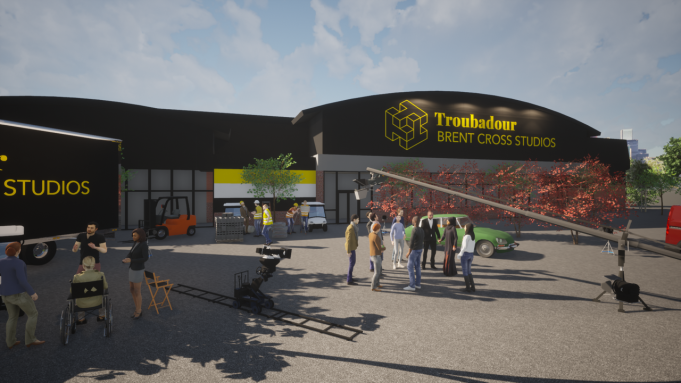Almost £1BN ($1.3BN) of spend on UK TV and film studios was pledged or delivered between 2017 and 2020, according to BFI data that showed the sector is in a boom period of post-pandemic recovery.
The Institute’s mammoth 324-page Screen Business report found that £785.4M ($1BN) was announced for studio projects that had received planning permission by the end of last year, with a further £131.6M ($174M) spent on building or expanding studios from 2017 to 2019.
Just last week, two new studios were unveiled in North and West London, with RD Studios and Troubadour Brent Cross (pictured) set to open next year.
Screen Business flagged growth in other cities such as Belfast’s Harbour Studios and Edinburgh’s First Stage Studios, along with new facilities in Leeds and Liverpool.
BBC Studios Unveils Chief Operating Officer Martyn Freeman
The BFI put the hefty spend down to “the significant amount of expenditure undertaken in the UK by film and television projects accessing the UK’s screen sector tax reliefs.”
“Signs of bounce back”
The production industry’s swift recovery since the pandemic started was also laid bare by more BFI data that found the combined spend on HETV and film production this year so far to be £4.7BN ($6.2BN), with the majority – £3.3BN ($4.4BN) – going towards HETV shows.
The second quarter of this year hit a record £2.25BN ($£3BN) for HETV, with more detailed figures to come once the year is up.
Speaking to journalists in a press briefing, BFI CEO Ben Roberts pointed to “early signs of the sector bouncing back very strongly” in 2021.
He cited the UK government’s £500M ($660BN) Film & TV Production Restart Scheme, which cleared a path for shows to return to production following last summer’s strict lockdown, along with a surge in streamer shows filming in the nation.
Playing catchup
The majority of the data, which covers the pre-pandemic 2017 to 2019 era, showed how HETV caught up with and subsequently overtook film.
HETV spend almost doubled over that 36-month period to £2.1BN ($2.8BN) while film fell slightly to £2BN ($2.6BN), although employment was far higher in film (120,650 vs 74,620) in 2019 and film also generated almost double the amount for the UK economy (£7.6BN ($10.1BN) vs $4.2BN ($5.6BN)).
Richard Madden in 'Bodyguard'
The growth in HETV was driven by international players and co-productions, which rocketed from £870M ($1.2BN) in 2017 to £1.6BN ($2.1BN) in 2019. Meanwhile, ratings data found viewing share to HETV over the period grew significantly from 9.4% in 2017 to 12.9% in 2019, with shows such as BBC1’s Bodyguard (pictured – right) and ITV’s Manhunt dominating the airwaves.
Overall, the film, HETV, animation and video games sectors generated a whopping £13.5BN ($17.9BN) for the UK economy in 2019, driven by the various government tax reliefs overseen by the BFI and creating 200,000 jobs.
“This report shows just how important government action has been in driving unprecedented growth across the screen industries,” said new UK Culture Secretary Nadine Dorries.
SOURCE : Deadline




